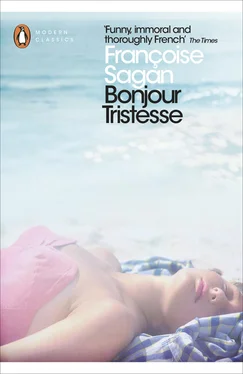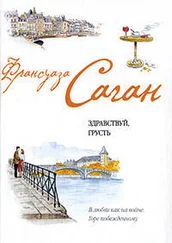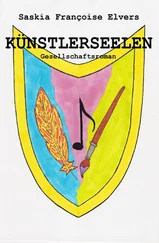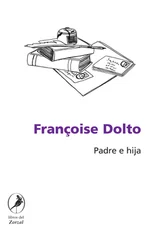Aside from these incidents, and suffusing our everyday life, there was Anne’s confidence, her gentleness and – it pains me to use the word – her happiness. She was in fact closer to happiness than I had ever seen her, and although she had given herself over to the egoists that we were, she was far removed from our tempestuous desires and my low little schemes. This was precisely what I had counted on, that her aloofness and pride would instinctively prevent her from employing any kind of tactic to bind herself more closely to my father, would prevent her, indeed, from using any type of seductiveness other than that of being beautiful, intelligent and tender. I began to feel more and more sorry for her. Pity is a most agreeable emotion. It carries you along like the music of a military band. No one could reproach me for feeling it.
It happened one morning that the maid, in great excitement, handed me a note from Elsa which read as follows: ‘Come quickly! It’s all working out!’ I had the impression that a catastrophe was in the offing: I hate it when things come to a head. Anyway, I met a triumphant-looking Elsa on the beach.
‘I’ve just seen your father. I mean, an hour ago.’
‘What did he say?’
‘He told me he was extremely sorry about what had happened and that he’d behaved very boorishly. Well, it’s true, isn’t it?’
I thought it best to agree.
‘Then he paid me various compliments, the way only he can … you know, in that rather detached tone of his, and very quietly, as if it were causing him pain … that tone of voice …’
I dragged her back to reality from her idyllic visions:
‘What was the upshot?’
‘Well, nothing really … No, there was something, he invited me to take tea with him in the village, to show that I had no hard feelings and that I was broadminded, you know what I mean, progressive.’
I was greatly amused at the thought of the views my father might have on the progressiveness of red-headed young women.
‘Why are you laughing? Am I to go?’
I almost replied that it was nothing to do with me. Then I realized that she credited me with the success of her stratagems. Rightly or wrongly, that irritated me. I felt cornered.
‘I don’t know, Elsa. It’s up to you. Don’t keep asking me what to do. Anyone would think I’m the one pushing you …’
‘But you are,’ she said. ‘After all, it’s thanks to you that …’
The admiring way in which she spoke suddenly frightened me.
‘Go if you want to. Just, for heaven’s sake, don’t talk to me about it any more!’
‘But we have to get rid of that woman for him … don’t we, Cécile?’
I fled. My father could do as he wished and Anne could sort herself out as best she could. In any case, I had a date with Cyril. It seemed to me that love was the only antidote to the fear that was sapping me.
Cyril took me in his arms without a word and led me off. When I was with him, everything became simple and charged with intensity and pleasure. Later, lying stretched out against that golden, sweat-bathed torso of his, and feeling exhausted and adrift, as if I had been shipwrecked, I told him that I hated myself. I smiled when I told him, for, although I meant it, the thought caused me no pain, just a kind of pleasant resignation. He did not take me seriously.
‘It doesn’t matter. I love you enough to make you share my opinion of you. I love you, I love you so much.’
The lilt of that sentence stayed with me right through lunch: ‘I love you, I love you so much.’ That’s why, although I’ve tried, I no longer remember much of that meal. Anne was wearing a mauve dress whose colour matched the circles under her eyes, and her eyes themselves. My father laughed and appeared to be relaxed: the situation was working out for him. Over dessert he announced that he had shopping to do in the village that afternoon. I smiled to myself. I was tired and I was feeling fatalistic. All I wanted to do was to have a swim.
At four o’clock I set off down to the beach. I ran into my father on the terrace as he was leaving to go to the village. I said nothing. I did not even warn him to be careful.
The water was warm and caressing. There was no sign of Anne; she must have been busy with her collection, drawing in her room while my father was playing the ladies’ man with Elsa. Two hours elapsed and, as it was no longer warm enough to sunbathe, I went back up to the terrace, sat down in a chair and opened a magazine.
It was just then that Anne appeared, coming from the direction of the wood. She was running, and with some difficulty, awkwardly, with her elbows held against her sides. I had the sudden, shocking impression that it was an old lady running and that she was going to fall. I was aghast. She disappeared behind the house, heading for the garage. Then all at once I realized what had happened and I too began to run, to catch up with her.
She was already in her car and turning the ignition. I rushed up and threw myself against the door.
‘Anne,’ I cried, ‘Anne, don’t go. It’s all a mistake, it’s my fault, I can explain …’
She was neither listening to nor looking at me, but leaning forward to release the handbrake.
‘We need you, Anne!’
At that, she straightened up. Her composure had gone and she was crying. Then all at once I saw that I had been attacking a living creature, a creature with feelings and not an abstraction. She must once have been a little girl, on the secretive side, then a teenager, then a woman. She was forty years old, she was on her own, she loved a man and she had hoped to be happy with him for ten, maybe twenty years. And as for me … that face, that face of hers, was my handiwork. I was rooted to the spot, my whole body trembling as I leant against the car door.
‘You don’t need anyone,’ she murmured. ‘Neither of you does.’
The engine was running. I was in despair; she couldn’t leave like that!
‘Forgive me, I beg you …’
‘Forgive you for what?’
The tears continued to stream down her cheeks. She did not seem to notice them and her face was rigid.
‘My poor little girl!’
She laid her hand on my cheek for an instant and then she was gone. I watched her car disappear round the side of the house. I was lost, adrift … It had all happened so quickly. And that face of hers, that face …
I heard footsteps behind me: it was my father. He had taken the time to remove traces of Elsa’s lipstick and to brush the pine needles from his suit. I turned round and threw myself at him:
‘You bastard!’
I began to sob.
‘What’s going on? Has Anne …? Cécile, tell me, Cécile …’
Eleven
We did not meet again until dinner, both of us nervous about this togetherness that was so suddenly ours again. I was not in the least hungry and neither was he. We both knew that it was essential for Anne to come back to us. For my part, I could not bear for long the memory of the distraught face that she had turned towards me before she left, nor the thought of her grief and my responsibility. I had forgotten all about my patient stratagems and the plans that I had so carefully laid. I felt that I had completely lost my compass, there was nothing to guide me, and I could see from my father’s face that he felt the same way.
‘Do you think she has abandoned us for long?’ he asked.
‘She’s no doubt heading for Paris,’ I replied.
‘Paris …’ my father murmured pensively.
‘Perhaps we shall never see her again.’
He looked at me, quite at a loss, and took my hand across the table.
‘You must hold this against me terribly. I don’t know what got into me … On the way back through the wood with Elsa, she … The fact is, I kissed her and Anne must have arrived at that very moment and …’
Читать дальше












